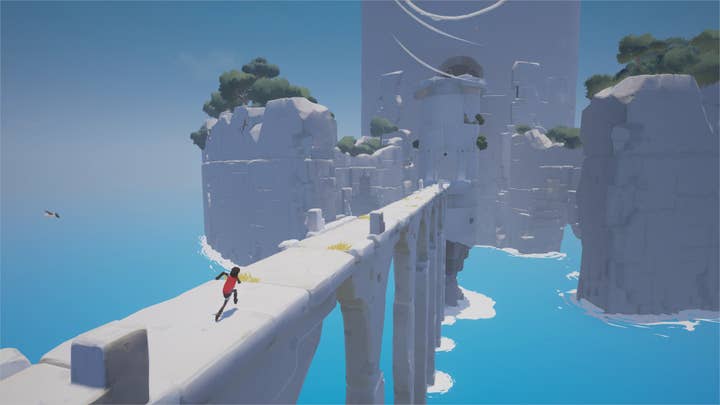Rime pairs accessible gameplay with relatable loss | Why I Love
Grimorio of Games' Jose Antonio Andujar Clavell shares how TequilaWorks' fantasy swept him away
Why I Love is a series of guest editorials on GamesIndustry.biz intended to showcase the ways in which game developers appreciate each other's work. This entry was contributed by Jose Antonio Andujar Clavell, CEO of Grimorio of Games whose monster summoning action roguelike Sword of the Necromancer is available now on PlayStation 4, Xbox One, Switch, and PC.
I'd been looking forward to Rime for a long time leading up to its release in 2017. I was instantly enamoured with its sun-kissed Mediterranean island, its enchanted fantasy creatures, and its innocent boy protagonist scampering about. On top of that, it was developed by Tequila Works (another Spanish studio), so seeing what this local studio was capable of offered me an admittedly biased rooting interest in its success. I'd wanted Rime to be good, but I had no idea it would be this good.
As soon as I booted it up on launch day I was immediately transported. I loved that the game had no UI to detract from the immersion, and the lack of any overt guidance or waypoints offered a freeform experience that felt very relaxing.
It gave the illusion of danger, without the frustration that I often feel in action games
As someone with a stressful job, I tend to play video games to unwind. Multiplayer games and shooters tend to be a little too demanding for me, so Rime's slower rhythm felt completely soothing to me. It still had plenty of challenge and excitement (a sequence where a giant, bird-like creature chases you on a bridge was particularly harrowing), but it didn't require several restarts to succeed at. It gave the illusion of danger, without the frustration that I often feel in action games.
The puzzles were likewise a joy to solve. Tinkering around with light beams and restoring strange, alien machinery felt genuinely playful. It was the kind of low-key adventure that offered the perfect pacing and never overstayed its welcome. I don't typically have a lot of time to play video games, so Rime's ability to compact a varied, five-chapter adventure into a handful of hours felt very respectful of my time. In fact, I loved it so much that I even played through it a second time!
From here on out, I'm going to get into spoiler territory regarding the game's ending, so turn back now if you've not completed Rime.
Okay, still here? So Rime's conclusion is among the most affecting sequences I've ever experienced in a video game. In Rime's final act we see a flashback of our young protagonist on a boat with his father amidst a raging storm. The boy is wearing a red coat rather than his usual tunic, suggesting that we're not in a fantasy world any longer. It's here that we see the boy flung over the railing. His father tries to catch him, but only manages to secure a piece of his jacket that tears off, leaving the boy to drown amidst the crashing waves. It's an utter jaw-dropper, and brings a whole new meaning to everything we've seen up until this point.
From the first moment I started playing Rime felt like a dream to me, but now I discovered that it was literally a dream set amidst an actual tragedy.
This tear-jerker of an ending gains further significance in the denouement after this reveal. We then return to playing as the boy, last seen descending a colossal tower, and this time he's wandering an ashen, colorless house before emerging in front of a giant abyss containing the stars. The boy falls into this chasm and the glistening night sky transitions into that of the present day, and when the camera pans down we're now playing as the father, alone in his house. In the final shot the father hugs the ghost of his son, clutches his crimson scarf (which is really the scrap from his jacket before falling into the sea), and lets the loose cloth flutter away in the breeze, signifying his acceptance of this loss.
This scenario simultaneously made me sad beyond all measure, but also completely overjoyed that this wasn't my reality
As a father myself, this shook me. I thought, “This could be me!” It was a freak accident, and this could happen to anyone. I found myself imagining how devastated I'd be if anything happened to my daughters. This scenario simultaneously made me sad beyond all measure, but also completely overjoyed that this wasn't my reality. That my daughters were present and safe and close to me. Rime is a game that makes you want to hug your loved ones.
Naturally, I introduced my daughters (8 and 10 at the time) to Rime, eager to share the experience with them. While they didn't pick up on the symbolism of the ending, it didn't matter, as they still had a great time exploring the lush landscapes and solving the puzzles (when I wasn't backseat gaming, offering them solutions anyway).
That's part of Rime's beauty: it works for all ages. Parent and child alike could play Rime and be swept away in its gorgeous environments and magical atmosphere, yet older players could find extra meaning in its metaphors. Rime works on so many levels, and holds a place near and dear to my heart as an example of what video games are capable of.
Developers interested in contributing their own Why I Love column are encouraged to reach out to us at news@gamesindustry.biz.

